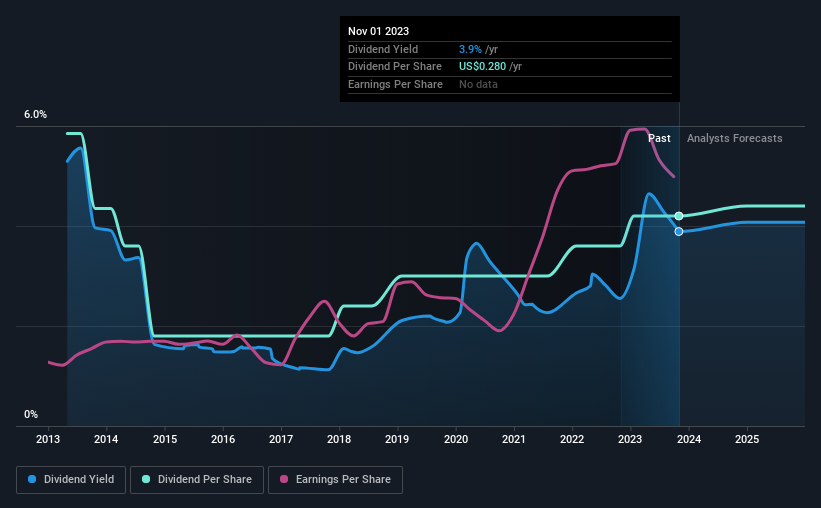Here's What We Like About Western New England Bancorp's (NASDAQ:WNEB) Upcoming Dividend
Some investors rely on dividends for growing their wealth, and if you're one of those dividend sleuths, you might be intrigued to know that Western New England Bancorp, Inc. (NASDAQ:WNEB) is about to go ex-dividend in just four days. The ex-dividend date occurs one day before the record date which is the day on which shareholders need to be on the company's books in order to receive a dividend. The ex-dividend date is an important date to be aware of as any purchase of the stock made on or after this date might mean a late settlement that doesn't show on the record date. Therefore, if you purchase Western New England Bancorp's shares on or after the 7th of November, you won't be eligible to receive the dividend, when it is paid on the 22nd of November.
The company's next dividend payment will be US$0.07 per share, on the back of last year when the company paid a total of US$0.28 to shareholders. Based on the last year's worth of payments, Western New England Bancorp stock has a trailing yield of around 3.9% on the current share price of $7.2. If you buy this business for its dividend, you should have an idea of whether Western New England Bancorp's dividend is reliable and sustainable. We need to see whether the dividend is covered by earnings and if it's growing.
See our latest analysis for Western New England Bancorp
Dividends are usually paid out of company profits, so if a company pays out more than it earned then its dividend is usually at greater risk of being cut. Fortunately Western New England Bancorp's payout ratio is modest, at just 28% of profit.
Generally speaking, the lower a company's payout ratios, the more resilient its dividend usually is.
Click here to see the company's payout ratio, plus analyst estimates of its future dividends.
Have Earnings And Dividends Been Growing?
Businesses with strong growth prospects usually make the best dividend payers, because it's easier to grow dividends when earnings per share are improving. If business enters a downturn and the dividend is cut, the company could see its value fall precipitously. Fortunately for readers, Western New England Bancorp's earnings per share have been growing at 19% a year for the past five years.
The main way most investors will assess a company's dividend prospects is by checking the historical rate of dividend growth. Western New England Bancorp's dividend payments per share have declined at 3.3% per year on average over the past 10 years, which is uninspiring. It's unusual to see earnings per share increasing at the same time as dividends per share have been in decline. We'd hope it's because the company is reinvesting heavily in its business, but it could also suggest business is lumpy.
Final Takeaway
From a dividend perspective, should investors buy or avoid Western New England Bancorp? Companies like Western New England Bancorp that are growing rapidly and paying out a low fraction of earnings, are usually reinvesting heavily in their business. Perhaps even more importantly - this can sometimes signal management is focused on the long term future of the business. Overall, Western New England Bancorp looks like a promising dividend stock in this analysis, and we think it would be worth investigating further.
In light of that, while Western New England Bancorp has an appealing dividend, it's worth knowing the risks involved with this stock. To help with this, we've discovered 2 warning signs for Western New England Bancorp (1 is a bit concerning!) that you ought to be aware of before buying the shares.
Generally, we wouldn't recommend just buying the first dividend stock you see. Here's a curated list of interesting stocks that are strong dividend payers.
Have feedback on this article? Concerned about the content? Get in touch with us directly. Alternatively, email editorial-team (at) simplywallst.com.
This article by Simply Wall St is general in nature. We provide commentary based on historical data and analyst forecasts only using an unbiased methodology and our articles are not intended to be financial advice. It does not constitute a recommendation to buy or sell any stock, and does not take account of your objectives, or your financial situation. We aim to bring you long-term focused analysis driven by fundamental data. Note that our analysis may not factor in the latest price-sensitive company announcements or qualitative material. Simply Wall St has no position in any stocks mentioned.

